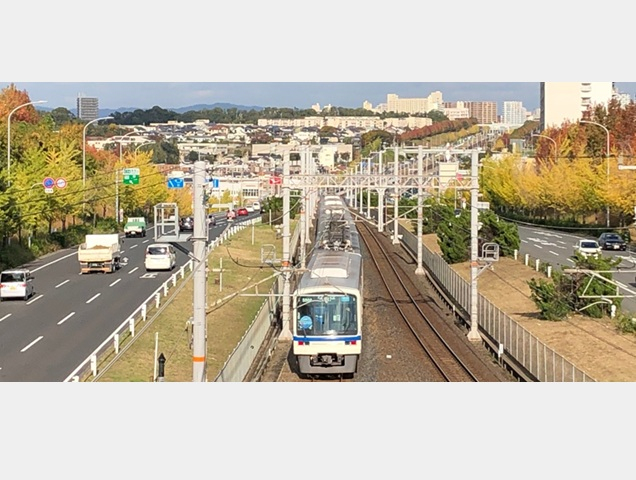Research News
Nov 13, 2025
- Human Life and Ecology
Fair fare
Determining proper subsidies for walking rewards
Senboku Line in Osaka
Residents living along the Senboku Rapid Railway participated in a study to test the effect of subsidized train fares in exchange for increased walking steps.
Credit: Haruka Kato, Osaka Metropolitan University

The unforeseen consequences of modern lifestyles are coming to the forefront as healthcare costs spike in developed countries worldwide. One method to mitigate this is to encourage walking to promote good health. Therefore, initiatives to increase daily steps have been taking shape and becoming subjects for in-depth study.
Dr. Haruka Kato, a junior associate professor at Osaka Metropolitan University, with policy planners from the Sakai City Government investigated the effect of a train fare subsidy program on daily walking steps. A 7-week randomized controlled trial of 900 participants who used the HealthSmart-Senboku smartphone application was designed to investigate the steps of the following subgroups: prime-aged adults (20–49 years old), middle-aged adults (50–64 years old), and older adults (≥65 years old). This study subsidized the intervention group with either 2000 or 1000 points, which could be exchanged for digital train tickets worth 2000 JPY or 1000 JPY on the Senboku Rapid Railway.
The team found that the intervention group subsidized with 1000 points significantly increased daily walking steps by 711.43 steps/day for prime-aged adults. However, middle-aged and older adults in this group did not have significantly more steps than the control group. Similarly, the intervention group subsidized with 2000 points did not significantly change their daily walking steps across all age subgroups.
“These findings suggest that fare subsidy programs that encourage active travel require appropriate pricing,” said Dr. Kato, “Further, this provides important insights into the effectiveness of train fare subsidy programs for prime-aged adults.”
The findings were published in Research in Transportation Economics.
Funding
Haruka Kato received funding from the Japan Society for the Promotion of Science (24K17421).
Paper information
Journal: Research in Transportation Economics
Title: Effects of a train fare subsidy program on the daily walking steps of prime-aged adults: A randomized controlled trial of the Senboku Rapid Railway
DOI: 10.1016/j.retrec.2025.101639
Authors: Haruka Kato, Kaoru Hanaie, Kenta Nakagawa
Published: 25 September 2025
URL: https://doi.org/10.1016/j.retrec.2025.101639
Contact
Haruka Kato
Graduate School of Human Life and Ecology
E-mail: haruka-kato[at]omu.ac.jp
*Please change [at] to @.
SDGs

